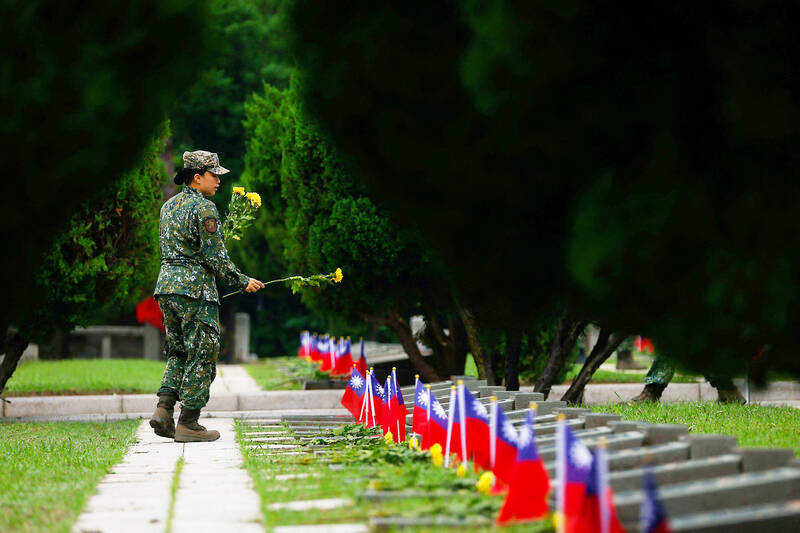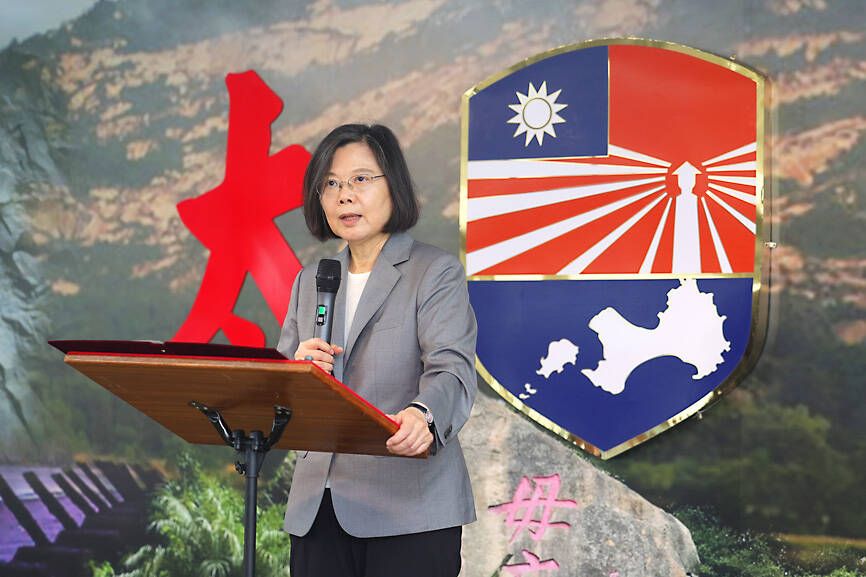A powerful defense is needed to maintain peace, President Tsai Ing-wen (蔡英文) said yesterday as she led her final remembrance service as Taiwan’s commander in chief for those killed during the 1958 defense of Kinmen County against a Chinese People’s Liberation Army (PLA) invasion.
Her visit to Kinmen — just a few kilometers from China at its closest point — comes as Beijing has increased military activity around Taiwan.
It was the third time since taking office in 2016 that Tsai has attended the annual memorial, which marks the anniversary of the start of a massive PLA artillery bombardment of Kinmen at the beginning of the Second Taiwan Strait Crisis 65 years ago.

Photo: Ann Wang, Reuters
The president burned incense, laid a wreath and bowed her head to pay her respects to those who died during the conflict. She was accompanied by Minister of National Defense Chiu Kuo-cheng (邱國正) and National Security Council Secretary-General Wellington Koo (顧立雄).
Tsai recalled how the troops and civilians “fought with one heart and persisted in repelling the enemy forces who tried to invade.”
“To keep the peace, we need to strengthen ourselves,” Tsai said. “As such, we need to continue to reform the national defense, push for self-reliance, strengthen our defense capabilities and resilience.”

Photo: CNA
The president later attended a luncheon for survivors and family members of those killed during the 1958 bombardment, in which Kinmen was hit with 475,000 artillery shells over 44 days.
“Our position on maintaining peace and stability in the Taiwan Strait is very firm,” Tsai said at the lunch, adding that there would be no Taiwan today if they had not prevailed during the crisis in 1958.
Fighting broke out on Aug. 23, 1958, when Chinese forces began an intense bombardment of Taiwan’s outlying Kinmen and Lienchiang counties in a bid to dislodge the Republic of China (ROC) government, which had retreated from China to Taiwan after losing the Chinese Civil War.
Taiwan fought with support from the US, which sent military equipment such as Sidewinder anti-aircraft missiles, giving Taiwan a technological edge.
The crisis ended in a stalemate.
Additional reporting by AP and AFP

The Taiwanese passport ranked 33rd in a global listing of passports by convenience this month, rising three places from last month’s ranking, but matching its position in January last year. The Henley Passport Index, an international ranking of passports by the number of designations its holder can travel to without a visa, showed that the Taiwan passport enables holders to travel to 139 countries and territories without a visa. Singapore’s passport was ranked the most powerful with visa-free access to 192 destinations out of 227, according to the index published on Tuesday by UK-based migration investment consultancy firm Henley and Partners. Japan’s and

NATIONAL SECURITY THREAT: An official said that Guan Guan’s comments had gone beyond the threshold of free speech, as she advocated for the destruction of the ROC China-born media influencer Guan Guan’s (關關) residency permit has been revoked for repeatedly posting pro-China content that threatens national security, the National Immigration Agency said yesterday. Guan Guan has said many controversial things in her videos posted to Douyin (抖音), including “the red flag will soon be painted all over Taiwan” and “Taiwan is an inseparable part of China,” while expressing hope for expedited “reunification.” The agency received multiple reports alleging that Guan Guan had advocated for armed reunification last year. After investigating, the agency last month issued a notice requiring her to appear and account for her actions. Guan Guan appeared as required,

Japan and the Philippines yesterday signed a defense pact that would allow the tax-free provision of ammunition, fuel, food and other necessities when their forces stage joint training to boost deterrence against China’s growing aggression in the region and to bolster their preparation for natural disasters. Japan has faced increasing political, trade and security tensions with China, which was angered by Japanese Prime Minister Sanae Takaichi’s remark that a Chinese attack on Taiwan would be a survival-threatening situation for Japan, triggering a military response. Japan and the Philippines have also had separate territorial conflicts with Beijing in the East and South China

A strong cold air mass is expected to arrive tonight, bringing a change in weather and a drop in temperature, the Central Weather Administration (CWA) said. The coldest time would be early on Thursday morning, with temperatures in some areas dipping as low as 8°C, it said. Daytime highs yesterday were 22°C to 24°C in northern and eastern Taiwan, and about 25°C to 28°C in the central and southern regions, it said. However, nighttime lows would dip to about 15°C to 16°C in central and northern Taiwan as well as the northeast, and 17°C to 19°C elsewhere, it said. Tropical Storm Nokaen, currently